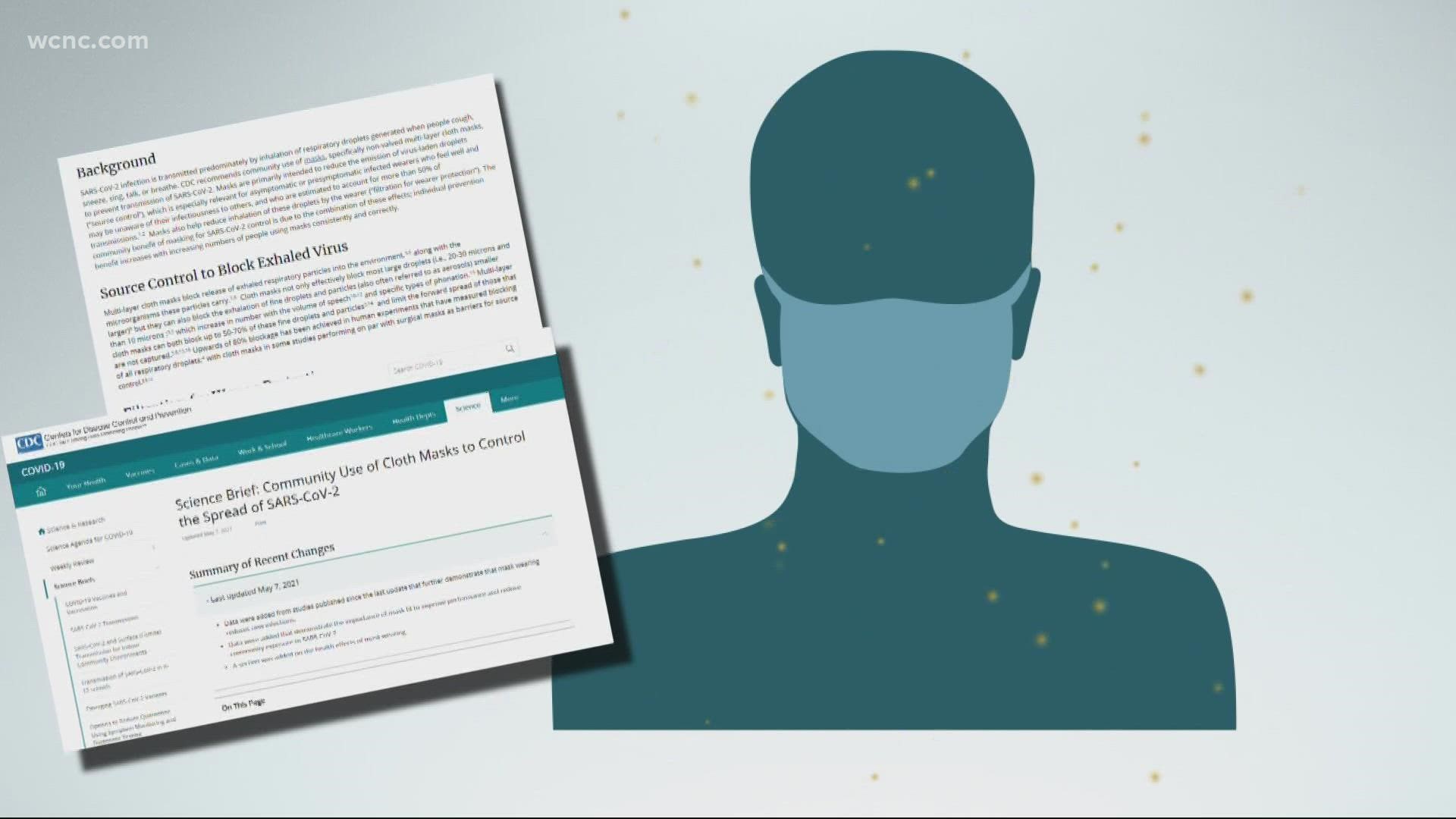CHARLOTTE, N.C. — With all the back and forth between the CDC and state and local governments we know there are a lot of questions about masks and the vaccine, so we wanted to tackle some of the ones we’re getting the most.
CLAIM: Masks don’t keep people from spreading COVID-19.
ANSWER: False
According to The CDC, cloth masks not only effectively block large droplets but can often even block particles smaller than 10 microns.
Upwards of 80% blockage have been achieved in human experiments that have measured blocking of all respiratory droplets.
For the few particles that masks can’t block, they still limit the forward spread.
CLAIM: A mask only protects the person wearing it
ANSWER: False
According to the Cleveland Clinic, masks provide protection to those around you as well as yourself. That is because they act as barriers to respiratory droplets. That way the droplets have a hard time getting in or out.
CLAIM: Masks can cause other illnesses.
ANSWER: False
According to the CDC, research supports that mask-wearing has no significant adverse health effects for people wearing them.
Charlotte-area doctors agree.
“Getting an infection like a staph infection or some of the other bacteria is possible but it is fairly rare,” Doctor David Geier said.
The CDC went on to say that studies of healthy hospital workers, older adults, and adults with COPD reported no change in oxygen or carbon dioxide levels while wearing a cloth or surgical mask, either during rest or physical activity.
Now let’s dive into some claims we are hearing about COVID-19 and the vaccine.
CLAIM: You can still get COVID-19 when vaccinated
ANSWER: True
As of July 19, more than 164 million people have been vaccinated in the US.
However, none of the COVID-19 vaccines are 100% effective at preventing COVID-19. According to the CDC, there is a small percentage of fully vaccinated people who still get sick, are hospitalized, or even die from COVID-19. These are known as breakthrough cases.
The latest data from the CDC show from January through April, there were 10,262 breakthrough infections during a time when the US was logging 34,000 new cases a day, on the low end and 313,000 at its peak.
Ten percent of those breakthrough patients were hospitalized. Two percent died.
So we can verify it is true that you can still get COVID-19 when vaccinated but it is rarer. And even if you are a breakthrough case, you are likely to have less severe symptoms.
CLAIM: People who are vaccinated can still spread COVID-19.
ANSWER: True
According to the CDC, a growing body of evidence indicates that people fully vaccinated with the Pfizer or Moderna vaccine are less likely than unvaccinated persons to transmit COVID-19 to others if they still get it.
So we can verify that is true, but again, rarer.
CLAIM: Fully vaccinated people are transmitting COVID-19 at a higher rate than unvaccinated people.
ANSWER: False
CDC Director, Rochelle Walensky said the latest data on the delta variant indicates that some fully vaccinated people who are infected with the delta variant could potentially be contagious and spread COVID-19 to others. But she made it clear the vast majority of the spread of the delta variant is coming from unvaccinated Americans.
So we can verify that no, fully vaccinated people are not transmitting COVID-19 at a higher rate than unvaccinated people.
Contact Meghan Bragg at mbragg@wcnc.com and follow her on Facebook, Twitter and Instagram.
VERIFY is dedicated to helping the public distinguish between true and false information. The VERIFY team, with help from questions submitted by the audience, tracks the spread of stories or claims that need clarification or correction. Have something you want VERIFIED? Text us at 704-329-3600 or visit /verify.

